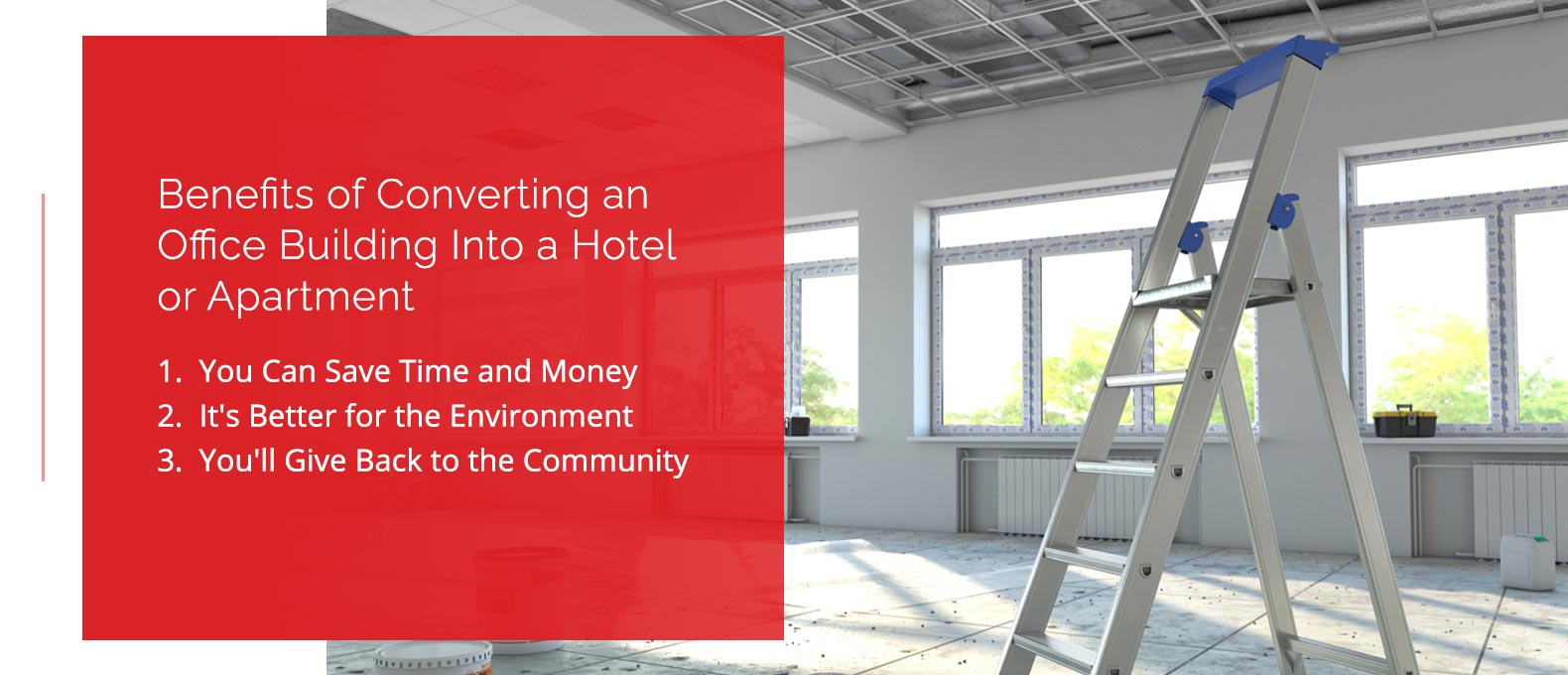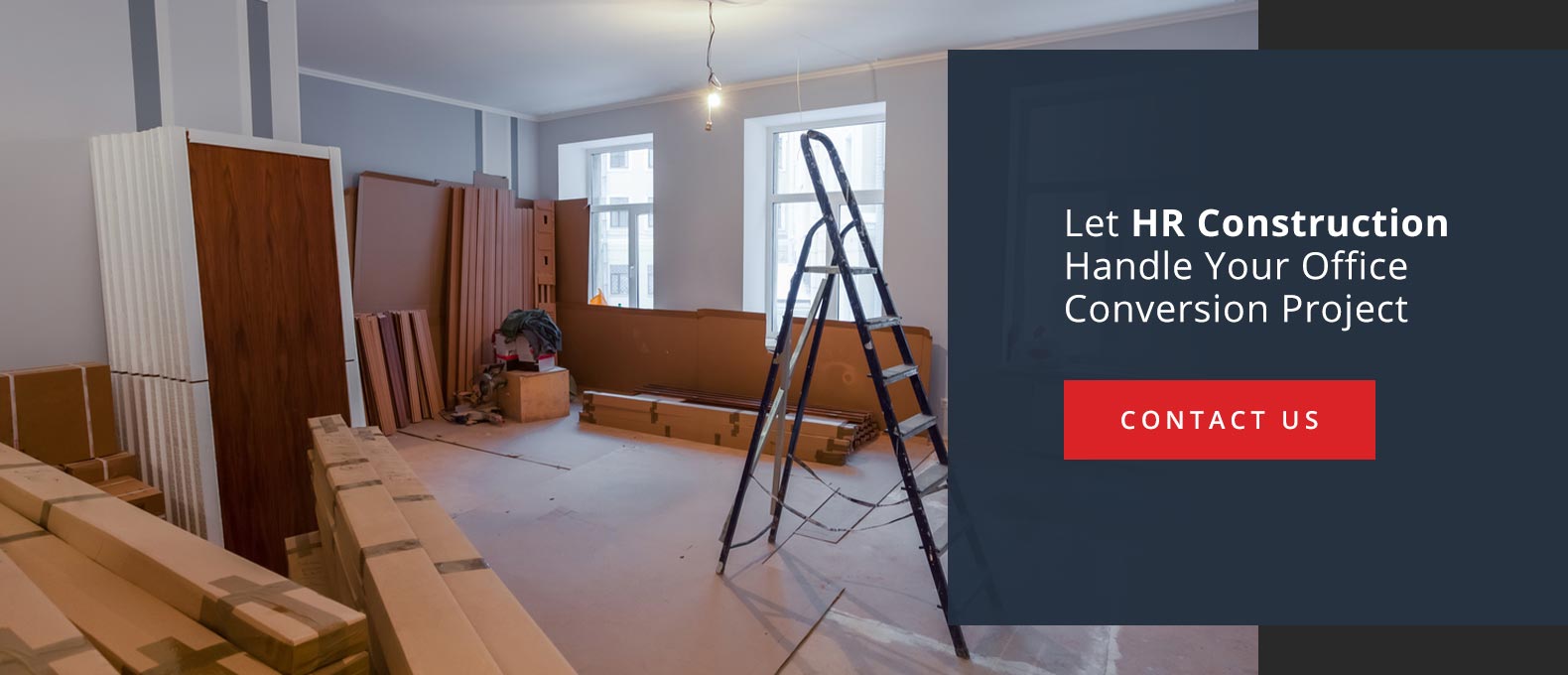Jump to:
- – Benefits of Converting an Office Building Into a Hotel or Apartment
- – How the Office Conversation Process Works
- – Converting to a Hotel vs. a Multifamily Property
An office-to-hotel or office-to-apartment conversion can benefit you, your community, and the environment. The commercial real estate landscape has seen a lot of changes in the past few years, leaving office building vacancy rates at the highest they’ve been since the 1990s. Experts predict the growing movement toward remote work will ultimately lead to nearly 40% fewer in-person workdays for companies nationwide. And, with nine of 10 surveyed employees reporting a strong desire to continue remote work moving forward.
Real estate investors and building owners nationwide face the same question — how can I turn this now-vacant office building into a profit? For many, the answer is converting existing office buildings to meet new needs, like operating a thriving hotel or a multifamily apartment community.
Benefits of Converting an Office Building Into a Hotel or Apartment
Adaptive reuse, or the process of adapting and repurposing an existing structure instead of building a new one, is a great way to minimize construction costs, reduce environmental impact, and see quicker project completion times. It can also be just the thing your community and neighbors need. And, with the slow down of new money for ground-up construction, readapting an existing property for another use is a solid investment.
1. You Can Save Time and Money
An office conversion to a hotel or apartment could take less time to complete compared to a new construction project, but it’s never guaranteed. New construction means taking time to include all the basics, like site prep and foundation installation. Still, renovation projects could take just as long or longer to finish, depending on the building’s condition and your end goals.
That said, conversion projects typically save the months of administrative work, approvals, and waiting you would go through with a new property. You might even be able to operate part of your building before it’s complete and use that income to boost returns — the same isn’t possible if you’re building from the ground up.
Less construction time also equals smaller labor costs, and converting a building takes much fewer building materials or demolition-related expenses. Many property owners can take advantage of additional tax breaks and financial incentives to repurpose old office buildings. One or more of the following could apply to you, depending on a property’s feasibility study and where you live:
- The Historic Renovation Preservation Tax Credit (HPTC) for renovating older buildings that meet specific requirements
- The New Markets Tax Credit (NMTC) for community development
- The Low Income Housing Tax Credit (LIHTC) for new and adaptive reuse projects that provide low-income housing
- Tax deductions for making energy-efficiency upgrades to commercial buildings
Some states offer additional incentives, with 36 states currently offering tax breaks for qualified renovations.

2. It’s Better for the Environment
Between equipment operation and materials operation, construction contributes 11% to global carbon emissions. Adaptive reuse can cut that percentage by nearly 80%.
Converting an existing building also lets you skip the costly demolition process, which represents over 90% of debris generated from construction and demolition projects. Construction projects without demolition only generate about 10% of debris.
3. You’ll Give Back to the Community
Recent renovation projects in cities like Detroit and Kansas City have sparked significant revitalization in their downtowns by providing more diversity and options for the communities there. New hotels and apartment buildings mean more families finding homes or visitors bringing in tourism dollars to the local economy — it’s even one way many cities are addressing the national housing shortage.
The best part of a conversion project is that you can transform your new property into whatever it needs to be — from a luxury boutique hotel to an urban apartment complex — without sacrificing the parts of the original construction that give your community its unique charm. Mix and match existing features, like original brickwork, with completely upgraded designs and energy-efficient technologies to create a truly unique building people will want to experience for themselves.
How the Office Conversation Process Works
Your project starts with the right property. Consider the following:
- Location: Consider the building’s location and if it fits your plans for the property. The most valuable resource for determining a great hotel location is a STAR report feasibility study (www.str.com, and now part of CoStar). STR provides comprehensive hotel benchmarking data to compare your past, present, and future performance against the competition in your selected area and market. For example, hotels are typically near business centers, airports, or local attractions, while apartments should be close to schools, shopping centers, and neighborhoods. Note the proximity to staples like public transportation and hospitals.
- Condition: Schedule a site assessment for your property to collect as much preliminary information as you can to see what kind of work needs to be done and what obstacles could interfere with construction. Your pre-construction assessment should include things like site geography and terrain, existing building materials and quality, the current and comparable real estate values, environmental concerns, and any site prep that should happen before renovation begins. HR Construction Group offers Pre-Construction as part of our renovation services — reach out to learn how we can help you assess your site’s condition and create a plan of action.
- Layout: Offices typically have a different layout from hotels or apartments. For example, office buildings have deep floor plates and minimal natural lighting in interior rooms, which isn’t ideal for apartment living since no part of any apartment can be more than 30 feet from a window to meet building codes. Examine what changes you’ll have to make to convert the existing layout to meet your new hotel or apartment’s needs and building regulations.
- Cost: Work with a financial advisor or accountant to run the numbers for your initial investment cost compared to ongoing maintenance or future sale costs. Don’t make the investment if the property has no hope of generating a good return.
Once you’ve found your property, reach out to the team at HR Construction Group — we’re here to help no matter the scope of your project.
Regulations to Know
Construction and renovation projects must adhere to specific guidelines, especially for commercial properties that will act as temporary or long-term housing. Consider the following:
- Property zoning: Cities have different zoning laws for various property uses. Many cities consider apartment buildings and hotels to be commercial real estate assets, which won’t necessarily match the office building zone classification. If you have to rezone the property, you’ll have to first get the changes approved through the local governing body, which requires one or more public hearings. The more complex the adjustments, the longer the rezoning process could take.
- Construction restrictions: Some office buildings might have their own building restrictions if they’re considered a historical property or registered landmark. You’ll also have to work around your local parking requirement laws — apartments may need multiple parking spots per apartment unit, which may be more than the former office building had paved.
- Building code requirements: Check local building requirements to see what’s required for apartment and hotel units, such as fire sprinkler and suppression systems, emergency exits, plumbing access, or wiring for kitchen setups. Note the property’s existing utilities, including water and sewer, and contact each company to see what changes they require.
Contact your local municipality for a complete list of all the permits and licenses you’ll need before you begin work.
Converting to a Hotel vs. a Multifamily Property
The main difference between a hotel and an apartment building is that hotels are considered an “operating building,” while apartments aren’t. Operating buildings need to be designed and built to accommodate 24/7 operations, which is critical information to know before hiring a general contractor.
A hotel or apartment could be the best use of your investment dollars, depending on all the information you’ve collected during your feasibility study and site assessment. Each building type has its advantages — 41% of apartments in 2021 are in buildings that were once offices since it’s a cost-efficient way to bring more housing to communities that need it.
Hotels may not promise the same type of steady revenue, but it typically costs less time and money to convert office layouts into a hotel. Hotel suites don’t need the same space, plumbing, and kitchen arrangements as apartment buildings.
Let HR Construction Group Handle Your Office Conversion Project
The Project Managers and Estimators at HR Construction Group are here to help you convert your office building into a thriving hotel or apartment. Contact us today to learn more about our start-to-finish construction services!




